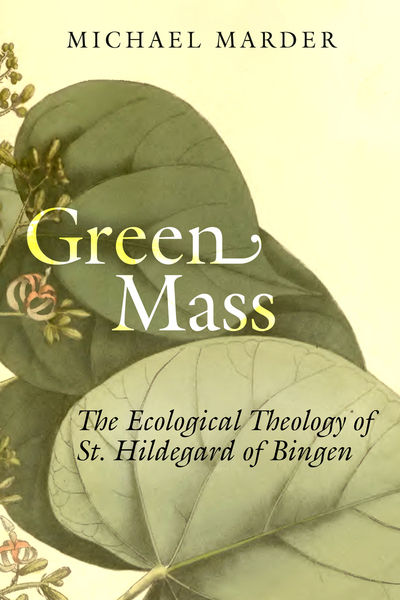
2021
184 pages.
from $25.00
Paperback now $12.50 (50% off)
Hardcover ISBN: 9781503628847
Paperback ISBN: 9781503629264
Ebook ISBN: 9781503629271
Green Mass is a meditation on—and with—twelfth-century Christian mystic and polymath Saint Hildegard of Bingen. Attending to Hildegard's vegetal vision, which greens theological tradition and imbues plant life with spirit, philosopher Michael Marder uncovers a verdant mode of thinking. The book stages a fresh encounter between present-day and premodern concerns, ecology and theology, philosophy and mysticism, the material and the spiritual, in word and sound.
Hildegard's lush notion of viriditas, the vegetal power of creation, is emblematic of her deeply entwined understanding of physical reality and spiritual elevation. From blossoming flora to burning desert, Marder plays with the symphonic multiplicity of meanings in her thought, listening to the resonances between the ardency of holy fire and the aridity of a world aflame. Across Hildegard's cosmos, we hear the anarchic proliferation of her ecological theology, in which both God and greening are circular, without beginning or end.
Introduced with a foreword by philosopher Marcia Sá Cavalcante Schuback and accompanied by cellist Peter Schuback's musical movements, which echo both Hildegard's own compositions and key themes in each chapter of the book, this multifaceted work creates a resonance chamber, in which to discover the living world anew.
The original compositions accompanying each chapter are available free for streaming and for download at www.sup.org/greenmass
About the author
Michael Marder is Ikerbasque Research Professor of Philosophy at the University of the Basque Country (UPV/EHU), Vitoria-Gasteiz. His work spans the fields of environmental philosophy and ecological thought, political theory, and phenomenology, with books including Dust (2016), Heidegger: Phenomenology, Ecology, Politics (2018), and Pyropolitics in the World Ablaze (2020).
"Michael Marder brings Hildegard's creativity to light and to life, highlighting what is unique about her and, especially, what makes her such a needed voice that should be heard today."
—Willemien Otten, University of Chicago Divinity School
"A brilliant meditation on viriditas, where materiality and spirituality meet, and truly a 'resonance chamber' of themes that explore the full range of Hildegard's thinking, from roots to flowers."
—Charles M. Stang, Harvard Divinity School
"The wordviriditas is important to understand here. The author explains that it literally means 'the greening green,' and figuratively it means 'a self-refreshing vegetal power of creation ingrained in all finite things.' That's a mouthful, but it's also rich and beautiful. Take a moment to ponder such a world. This is St. Hildegard of Bingen's vision of what we inhabit, whether we realize it yet or not... Michael Marder points to the transformational quality of such teachings, for Christians and everyone who seeks to integrate the physical and the spiritual in their lives."
—Jon M. Sweeney, Spirituality & Practice
"I consider this to be one of the—if not the—most significant books of ecotheology to have appeared in recent years... Rather than attempt to explain Hildegard's many-layered analogies between divine spirit and vegetal mattering, Marder seeks to narrate the conditions under which those analogies could be true. The result is a book that is at once faithful to Hildegard's words (Green Mass is a close reading that cites source texts in detail, and dispenses with footnotes) and promiscuous in hermeneutic."
—Simone Kotva, Worldviews: Global Religions, Culture, and Ecology
"This is an extraordinary work of ecotheology. Not only is it a book, it is also a meditation at the meeting point of materiality and spirituality, a resonance chamber of Peter Schuback's musical compositions, and an invitation to encounter the present world through medieval mindsets."
—Luke Penkett, The Way